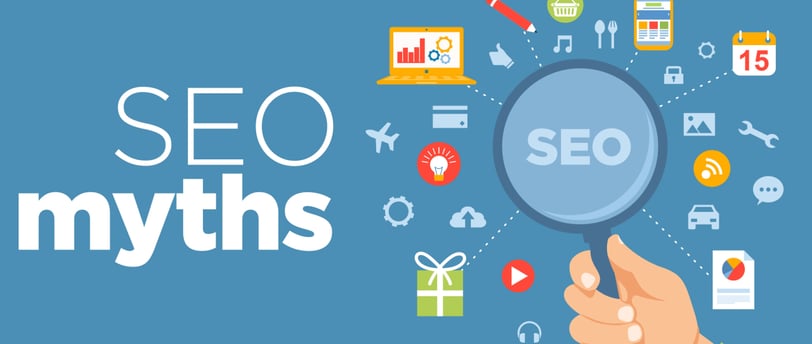Top 10 SEO Myths to Avoid in 2025
Stop wasting time on outdated SEO tactics! Uncover the top 10 SEO myths to avoid in 2025 and learn what actually works to improve your search rankings.
SEO SERVICES
Mbniram
5/2/20254 min read


Top 10 SEO Myths to Avoid in 2025
In the fast paced world of digital marketing, Search Engine Optimization (SEO) is constantly evolving. What worked five years ago may no longer be relevant today. Yet, many outdated strategies and SEO myths continue to circulate, misguiding website owners and content creators.
If you are serious about improving your rankings, driving traffic and generating leads in 2025, it’s time to separate fact from fiction.
In this article, we’ll expose the top 10 SEO myths that could be holding your website back and show you what to do instead.
Why SEO Myths Are Dangerous
SEO myths are not just harmless misunderstandings. They can lead you to:
Waste time and money on ineffective strategies
Get penalized by Google
Miss out on genuine traffic opportunities
One of our clients was obsessed with keyword mass and tried stuffing keywords into every sentence. Not only did their content sound robotic, but their ranking actually dropped! After we rewrote it using natural language and semantically related terms, they jumped to page one within weeks. Ready to avoid the same mistakes? Let’s dive in.
Myth #1: Keyword Stuffing Still Works
Stuffing a page with keywords might have worked in 2005 but in 2025, it’s a surefire way to tank your SEO. Google now efforts on user intent and content quality. Overusing the same phrase makes your content unreadable and may trigger penalties.
What to do instead:
Use semantically related keywords and write naturally. Tools like SurferSEO or Frase.io help you optimize your content without overstuffing.
Related: How to Write SEO-Friendly Content
Myth #2: You Need to Submit Your Site to Google
This one is ancient and totally unnecessary. Google's bots automatically discover new websites and pages through links. Unless your site is brand new you don’t need to manually submit it.
What to do instead:
Focus on internal linking, and ensure your site is easy to crawl. Use Google Search Console to track indexing status.
Learn more: What is Google Search Console?
Myth #3: More Pages Means Better Rankings
Some believe that simply publishing more pages will increase traffic. Quality > Quantity. Google rewards helpful, in depth content, not thin, duplicate, or low value pages.
What to do instead:
Focus on creating valuable content that thoroughly answers questions. Update older posts with fresh insights to keep them relevant.
Try this: Complete On-Page SEO Checklist
Myth #4: Backlinks Are Dead
Some marketers claim backlinks are no longer important. That’s false. High quality backlinks are still a top ranking factor in 2025. They show authority and trust.
What to do instead:
Earn backlinks through guest posting, creating shareable infographics, and publishing original research. Learn more: Backlinko's Link Building Guide
Myth #5: SEO Is a One-Time Task
This one’s a killer. Many business owners think they can “do SEO once” and be done. SEO is an ongoing process. Algorithms change, competitors grow, and user behavior shifts.
What to do instead:
Create a monthly SEO checklist. Monitor your performance in Google Analytics and update content regularly. Try: Our Monthly SEO Maintenance Plan
Myth #6: Exact Match Domains Rank Better
People used to buy domains like best cheap laptops-2025.com thinking they’d rank instantly. Today, branding and content quality matter far more. Google no longer gives preference to exact match domains.
What to do instead:
Choose a brand able, easy-to-remember domain and build authority through great content. Related: Google’s Domain Ranking Guide
Myth #7: Social Signals Directly Impact SEO
You might have heard that more Facebook likes = higher rankings. Not true (at least, not directly). Google doesn’t use social signals as a direct ranking factor, but social sharing helps by increasing traffic and link-building potential.
What to do instead:
Promote your content across social media to get visibility and shares, which may lead to organic backlinks. Learn: Moz on Social Media and SEO
Myth #8: Longer Content Always Ranks Better
Yes, long form content can rank well but only if it's valuable. User intent is what matters. A 500 word answer that solves a problem is better than a 2500 word down piece.
What to do instead:
Match your content length to the search intent. Use tools like AnswerThePublic to find what users are really asking. Try this guide: How to Create SEO Content People Actually Read
Myth #9: You Must Rank #1 to Get Clicks
While the top spot does get attention, there still plenty of traffic for positions 2–5 especially with good meta descriptions and rich scraps. Click through rate (CTR) depends on more than rank. Eye catching titles and scraps matter.
What to do instead:
Use compelling headlines and organized data to improve your appearance in the SERPs. Tool: Google's Rich Results Test
Myth #10: SEO Is Just About Google
Google dominates search, yes. But don’t ignore other platforms. Search happens on YouTube, Pinterest, Amazon, and even TikTok. These are all search engines in their own right.
What to do instead:
Expand your content strategy to include multi-platform SEO especially if you are in e-commerce, education or visual content. Resource: YouTube SEO in 2025
Final Thoughts: Stay Informed, Stay Ahead
If you’ve been following outdated advice, you are not alone. The key is to stay current, test what works, and focus on delivering real value to your audience.
Need help with SEO in 2025?
The team at Digital Teclab is here to guide you, update your strategy, and help you get the results you deserve. Book a Free Consultation and let us audit your site for SEO myths today.
Explore More from DigitalTeclab
5 On-Page SEO Tips to Boost Your Rankings
Local SEO Tips for Small Businesses
Services
Affordable solutions for your digital marketing needs.
Boost
Optimize
+923706733851
© 2025. All rights reserved.
